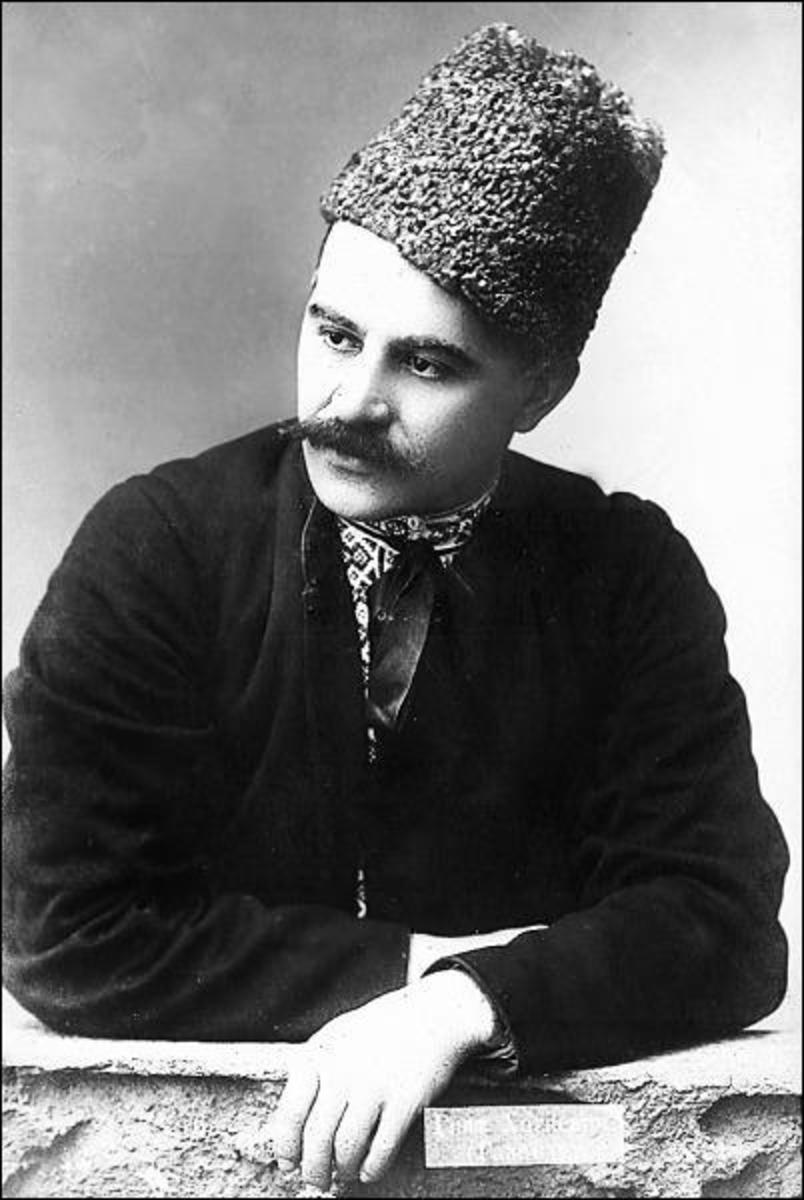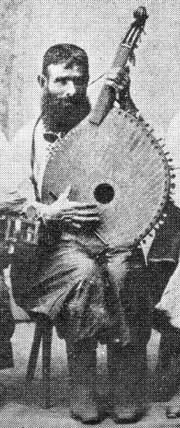|
XIIth Archeological Conference
The XIIth Archeological Congress Kharkiv, 1902 was one of a number of Archeological Conferences known as Congresses held in Russian Empire. These Conferences were hosted by a different city of the Russian Empire every three years. The 1902 the XIIth Archeological Congress was notable for a performance by kobzars from a number of regions of Ukraine, organized by writer and bandurist Hnat Khotkevych, who also wrote an accompanying paper. The success of this concert performance elevated the status of the kobzars, who had been persecuted by the Russian tsarist authorities. Kobzar performers For the conference six kobzars were invited; four from the regions around Kharkiv: Petro Drevchenko, Pavlo Hashchenko, Ivan Kuchuhura Kucherenko, Hrytsko Netesa; one from Poltava province; Mykhailo Kravchenko; and one from Chernihiv province: Terentiy Parkhomenko. To this group of six were added three lirnyks. Aftermath A review of the concert appeared in the journal "Etnograficheskoe Oboz ... [...More Info...] [...Related Items...] OR: [Wikipedia] [Google] [Baidu] |
Kharkiv
Kharkiv ( uk, wikt:Харків, Ха́рків, ), also known as Kharkov (russian: Харькoв, ), is the second-largest List of cities in Ukraine, city and List of hromadas of Ukraine, municipality in Ukraine.Kharkiv "never had eastern-western conflicts" ''Euronews'' (23 October 2014) Located in the northeast of the country, it is the largest city of the historic Sloboda Ukraine, Slobozhanshchyna region. Kharkiv is the administrative centre of Kharkiv Oblast and of the surrounding Kharkiv Raion. The latest population is Kharkiv was founded in 1654 as Kharkiv fortress, and after these humble beginnings, it grew to be a major centre of industry, trade and Ukrainian culture in the Russian Empire. At the beginning of the 20th century, ... [...More Info...] [...Related Items...] OR: [Wikipedia] [Google] [Baidu] |
Russian Empire
The Russian Empire was an empire and the final period of the Russian monarchy from 1721 to 1917, ruling across large parts of Eurasia. It succeeded the Tsardom of Russia following the Treaty of Nystad, which ended the Great Northern War. The rise of the Russian Empire coincided with the decline of neighbouring rival powers: the Swedish Empire, the Polish–Lithuanian Commonwealth, Qajar Iran, the Ottoman Empire, and Qing China. It also held colonies in North America between 1799 and 1867. Covering an area of approximately , it remains the third-largest empire in history, surpassed only by the British Empire and the Mongol Empire; it ruled over a population of 125.6 million people per the 1897 Russian census, which was the only census carried out during the entire imperial period. Owing to its geographic extent across three continents at its peak, it featured great ethnic, linguistic, religious, and economic diversity. From the 10th–17th centuries, the land ... [...More Info...] [...Related Items...] OR: [Wikipedia] [Google] [Baidu] |
Kobzars
A ''kobzar'' ( ua, кобзар, pl. kobzari ua, кобзарі) was an itinerant Ukrainian bard who sang to his own accompaniment, played on a multistringed bandura or kobza. Tradition Kobzars were often blind and became predominantly so by the 1800s. ''Kobzar'' literally means 'kobza player', a Ukrainian stringed instrument of the lute family, and more broadly — a performer of the musical material associated with the kobzar tradition. The professional kobzar tradition was established during the Hetmanate Era around the sixteenth century in Ukraine. Kobzars accompanied their singing with a musical instrument known as the kobza, bandura, or lira. Their repertoire primarily consisted of para-liturgical psalms and "kanty", and also included a unique epic form known as dumas. At the turn of the nineteenth century there were three regional kobzar schools: Chernihiv, Poltava, and Slobozhan, which were differentiated by repertoire and playing style. Guilds In Ukraine, kobzar ... [...More Info...] [...Related Items...] OR: [Wikipedia] [Google] [Baidu] |
Ukraine
Ukraine ( uk, Україна, Ukraïna, ) is a country in Eastern Europe. It is the second-largest European country after Russia, which it borders to the east and northeast. Ukraine covers approximately . Prior to the ongoing Russian invasion, it was the eighth-most populous country in Europe, with a population of around 41 million people. It is also bordered by Belarus to the north; by Poland, Slovakia, and Hungary to the west; and by Romania and Moldova to the southwest; with a coastline along the Black Sea and the Sea of Azov to the south and southeast. Kyiv is the nation's capital and largest city. Ukraine's state language is Ukrainian; Russian is also widely spoken, especially in the east and south. During the Middle Ages, Ukraine was the site of early Slavic expansion and the area later became a key centre of East Slavic culture under the state of Kievan Rus', which emerged in the 9th century. The state eventually disintegrated into rival regional po ... [...More Info...] [...Related Items...] OR: [Wikipedia] [Google] [Baidu] |
Hnat Khotkevych
Hnat Martynovych Khotkevych ( uk, Гнат Мартинович Хоткевич, also ''Gnat Khotkevich'' or ''Hnat Khotkevych'', born December 31, 1877 – died October 8, 1938) was a Ukrainian writer, ethnographer, playwright, composer, musicologist, and bandurist. Khotkevych was a renaissance man and was multi-talented. Although he was trained as a professional engineer, he is known more as a prolific Ukrainian literary figure, and also as a dramatist, composer and ethnographer, and father of the modern bandura. Early life and education Khotkevych was born in Kharkiv in 1877. His mother was a domestic worker, though little is known about his father, who left the family in the mid-1880s. As a youth he learned to play the piano and violin and later learned to play the bandura through observing the blind folk kobzars of the region. He completed his tertiary studies in engineering at the Kharkiv Polytechnic Institute in 1900, and then worked as a railway engineer. [...More Info...] [...Related Items...] OR: [Wikipedia] [Google] [Baidu] |
Petro Drevchenko
Petro Semenovych Drevchenko (1863 – 1934) was also known by the surname of Drevkin and Drygavka. Biography Drevchenko was born in 1863 in the Poltava Governorate of the Russian Empire (in present-day Ukraine) to a family of servants. From the age of 12 he lived in Kharkiv, in the area of Zalutin. At the age of 13 he came down with the mumps and lost his sight. At 14 he was apprenticed to kobzar Hnat Honcharenko for 4 years and at 18 completed his apprenticeship and received permission to become an independent kobzar. At the age of 20 he was married. Kryst wrote that Drevchenko reminded one of his teacher - Hnat Honcharenko. He had a fidgety character and was given the name Drygavka (meaning "spinning top"). He travelled around considerably giving numerous performances. Of the kobzars of the early 20th century he made public significant sections of the Ustynski books. He often performed with lirnyk Ivan Zozulia. He participated in the XIIth Archeological Congress in K ... [...More Info...] [...Related Items...] OR: [Wikipedia] [Google] [Baidu] |
Pavlo Hashchenko
Pavlo Ivanovych Hashchenko ( -1933) was a Ukrainian kobzar and bandura player. Hashchenko was originally from Poltava province but lived most of his life in the village of Konstantynivka, Bohodukhiv county, Kharkiv province. Among the kobzars of the Slobozhan region he was thought of as one of the best, and consequently he was invited to perform at the XIIth Archeological Conference held in Kharkiv in 1902. At that concert Hashchenko's solo performance included the satirical song "Popadia" and he performed in the ensemble with other kobzars. In 1905 Opanas Slastion painted a portrait of Hashchenko and noted that Hashchenko knew four '' dumy'' (sung epic poems). After the performance at the XIIth Archeological Conference Hashchenko performed at a numerous other kobzar A ''kobzar'' ( ua, кобзар, pl. kobzari ua, кобзарі) was an itinerant Ukrainian bard who sang to his own accompaniment, played on a multistringed bandura or kobza. Tradition Kobzars were of ... [...More Info...] [...Related Items...] OR: [Wikipedia] [Google] [Baidu] |
Ivan Kuchuhura Kucherenko
Ivan Iovych Kuchuhura-Kucherenko ( uk, Іван Іович Кучугура-Кучеренко; July 7, 1878 – November 24, 1937) was a Ukrainian minstrel (kobzar) and one of the most influential kobzars of the early 20th century. For his artistry he was awarded the title "People's artist of Ukraine" in 1919 and later "People's Artist of the Ukrainian Soviet Socialist Republic" in 1926. Biography Childhood Ivan Kucherenko (or as he later became known, ''Kuchuhura-Kucherenko'') was born on July 7, 1878 in the village of Murafa of Bohodukhiv uyezd in the Kharkov Governorate of the Russian Empire. At the age of 3, he became fully blind in his left eye and had some damage in his right eye. At the age of 8, he lost his father and became an orphan. The young Kucherenko had exceptional musical talent which directed him to the lifestyle of a kobzar. He was apprenticed to the kobzar Pavlo Hashchenko and began to perform as a kobzar at the turn of the 20th century. Education and ... [...More Info...] [...Related Items...] OR: [Wikipedia] [Google] [Baidu] |
Mykhailo Kravchenko
Mykhailo Stepanovych Kravchenko (1858-1917) was regarded as one of the most outstanding kobzars of Poltava province of the late 19th early 20th century. Biography Kravchenko was born in Velyki Sorochyntsi, Myrhorod county in 1858. At the age of 15 he caught scrofula and lost his sight. At the age of 17 he began to learn to sing psalms from Samiylo Yashny. Under whom else he studied we do not know. Literature states that he spent 9 months studying under Fedir Hrytsenko-Kholodny, but in his discussion with Hnat Khotkevych, Kravchenko made no mention of this. It is assumed that he spent time with other kobzars after his apprenticeship with Yashny. He was very poor because he not only supported his own family, but the family of his sick brother. In order to support two families he would also weave ropes for sale. This was a common occupation for the blind, but one which negatively influenced the art of the kobzar - "When you weave a ropes for a month - Kravchenko stated - from ... [...More Info...] [...Related Items...] OR: [Wikipedia] [Google] [Baidu] |
Chernihiv
Chernihiv ( uk, Черні́гів, , russian: Черни́гов, ; pl, Czernihów, ; la, Czernihovia), is a city and municipality in northern Ukraine, which serves as the administrative center of Chernihiv Oblast and Chernihiv Raion within the oblast. Chernihiv's population is The city was designated as a Hero City during the 2022 Russian Invasion of Ukraine. Geography Chernihiv stands on the Desna River to the north-north-east of Kyiv. The area was served by Chernihiv Shestovytsia Airport prior to 2002, and during the Cold War it was the site of Chernihiv air base. History Etymology The name "Chernihiv" is a compound name, which begins with the root 'Cherni/Cherno,' which means "black" in Slavic. Scholars vary with interpretations of the second part of the name ("hiv"/gov", "говъ") though scholars such as Dr. Martin Dimnik, Professor of Medieval History at University of Toronto, connect Cerhnihov with the worship of "the black god" Chernibog. Early history ... [...More Info...] [...Related Items...] OR: [Wikipedia] [Google] [Baidu] |
Tereshko Parkhomenko
Terentiy (Tereshko) Makarovych Parkhomenko (1872–1910) was one of the most respected kobzars of the late 19th and early 20th century. Biography He was born 10 September 1872 in the village of Voloskivtsi, Sosnytsia county, in the Chernigov Governorate of the Russian Empire. He became blind at the age of 11 after a grave illness. He learned to play the bandura from the kobzar Andriy Haydenko and became a sought out performer after his performance at the XIIth Archeological Conference. He had a tenor voice and a loud bandura and played songs with a patriotic content that were rarely performed by other kobzars. XIIth Archeological Conference This was the first stage performance of the kobzars organized by Hnat Khotkevych. The performance included the performances of six kobzars, including four from Kharkiv, one from Poltava province and one from Chernihiv province. After both the Kharkiv bandurists played and the Mykhailo Kravchenko played (and demonstrated what they knew) it w ... [...More Info...] [...Related Items...] OR: [Wikipedia] [Google] [Baidu] |






.jpg)